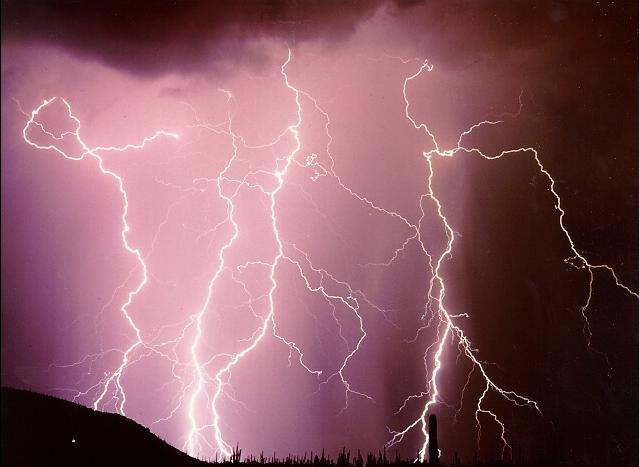 Of all weather phenomena, lightning is one of my favorites. It's amazing that electricity can build up in the air, then release in a sudden burst of light and sound. It can ignite forests, and melt dirt or sand into a clump, called a fulgurite. Lightning is terrifyingly powerful, and really neat to watch.
Of all weather phenomena, lightning is one of my favorites. It's amazing that electricity can build up in the air, then release in a sudden burst of light and sound. It can ignite forests, and melt dirt or sand into a clump, called a fulgurite. Lightning is terrifyingly powerful, and really neat to watch.I recently ran across a couple of articles about lightning. The first discusses new findings in the way life developed. Many bacteria have a gene that allows them use phosphite, a rare compound created almost exclusively by lightning strikes. When life first developed, around 4 billion years ago, however, phosphite was more common. It was introduced by meteorites, as well as lightning, and was more easily avaliable than the common phosphate. Today, phosphite is so rare that it is no longer metabolized. But many bacteria, like E. coli, still have the vestigial ability to use it.
 The other article discussed how cosmic rays could influence lightning, and how that, in turn, could influence the climate. Researchers in Portugal suggest that the occurance of lightning is related to the solar cycle. When there is a lot of solar activity, there are fewer charged particles in the Earth's atmosphere, causing more lightning. When the Sun is quiet, there is more cosmic ray flux, more charged particles in the air, and so fewer lightning storms.
The other article discussed how cosmic rays could influence lightning, and how that, in turn, could influence the climate. Researchers in Portugal suggest that the occurance of lightning is related to the solar cycle. When there is a lot of solar activity, there are fewer charged particles in the Earth's atmosphere, causing more lightning. When the Sun is quiet, there is more cosmic ray flux, more charged particles in the air, and so fewer lightning storms.This relates to climate change in an unusual way. Because of how the greenhouse effect works, the amount of cloud cover affects global temperature, as well as the amount of greenhouse gases. Thus, when solar activity is up, there is more cloud cover and more lightning along with it. This increase would about cancel out the effect of greenhouse gases during that short period of time.
The impacts of lightning are varied, and can be quite significant. And the occurence of lightning itself is amazing. There is nothing quite like seeing a lightning strike. It is terrifying, but also mesmerizing. It's one of the most interesting forces in nature.






